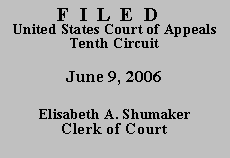

| UNITED STATES OF AMERICA,
Plaintiff-Appellee, |
|
| v. | |
| MARIA PETRA MACIAS-LOPEZ,
Defendant-Appellant. |
(D.C. Nos. CIV-04-943 RB/WDS and CR-03-2152-RB)
|
Macias-Lopez is a native of Mexico. On August 13, 2001, Macias-Lopez was removed from the United States after being convicted on February 19, 2001, of attempt to commit child abuse and battery of a peace officer. It is uncontroverted that Carter reentered the United States without permission to do so and was apprehended on September 1, 2003, by Border Patrol agents in the State of New Mexico. Macias-Lopez was charged in federal court with reentry of a deported alien previously convicted of an aggravated felony, in violation of 8 U.S.C. §§ 1326(a)(1) and (b)(2). Macias-Lopez pled guilty to the charge on October 29, 2003, without benefit of a plea agreement. On January 7, 2004, the district court sentenced Macias-Lopez to 46 months' imprisonment, a sentence at the bottom of the guideline range (46 to 57 months).
On August 17, 2004, Macias-Lopez filed her pro se § 2255 motion alleging that her trial counsel was ineffective for failing to prevent the district court from applying a sixteen-level enhancement due to her prior conviction for a violent felony. According to Macias-Lopez, the enhancement was improper because she had already been punished for her prior conviction. After directing the government to file a response, the magistrate judge assigned to the case issued a report recommending that Macias-Lopez's motion be denied. In doing so, the magistrate judge noted he had reviewed the transcript of Macias-Lopez's guilty plea and had found "no instance where defense counsel's performance in connection with the plea hearing was deficient, let alone 'below an objective standard of reasonableness.'" ROA, Doc. 9 at 6. The magistrate judge further concluded that Macias-Lopez could not establish prejudice "given the non-discretionary nature of the Sentencing Guidelines" at the time of her sentencing. Id. at 8. Finally, the magistrate judge concluded that, to the extent Macias-Lopez was asserting a violation of Blakely v. Washington, 542 U.S. 296 (2004), there was no merit to the argument because the only sentence enhancement imposed by the district court was on the basis of Macias-Lopez's prior conviction, and not on the basis of any judicially-found facts. The district court subsequently adopted the findings and recommendation of the magistrate and, on October 4, 2005, dismissed Macias-Lopez's petition. Thereafter, the district court denied Macias-Lopez a COA. Macias-Lopez has now filed a notice of appeal and seeks a COA from this court.
The denial of a motion for relief under § 2255 may be appealed only if the district court or this court first issues a COA. 28 U.S.C. § 2253(c)(1)(B). A COA "may issue . . . only if the applicant has made a substantial showing of the denial of a constitutional right." 28 U.S.C. § 2253(c)(2). In order to make such a showing, a petitioner must demonstrate that "reasonable jurists could debate whether . . . the petition should have been resolved in a different manner or that the issues presented were adequate to deserve encouragement to proceed further." Slack v. McDaniel, 529 U.S. 473, 484 (2000) (internal quotation marks omitted).
To support a claim of ineffective assistance of counsel, a petitioner must show that her attorney's performance "'fell below an objective standard of reasonableness' and that the unreasonably deficient performance resulted in prejudice." Lucero v. Kerby, 133 F.3d 1299, 1323 (10th Cir. 1998) (quoting Strickland v. Washington, 466 U.S. 668, 688, 691-92 (1984)). As noted, the magistrate judge concluded, and the district court agreed, that Macias-Lopez could not satisfy either of these two requirements.
After reviewing the record on appeal, we agree with the magistrate judge and the district court. Based upon Macias-Lopez's guilty plea, the district court was required under the United States Sentencing Guidelines to first impose a base offense level of eight, and then to increase that base offense level by sixteen levels due to Macias-Lopez having been previously deported after being convicted of a crime of violence. See U.S.S.G. §§ 2L1.2(a) and (b)(1)(A) (2003). Because there was no legal basis for challenging the sixteen-level enhancement, Macias-Lopez's defense counsel was clearly not ineffective for failing to object to that enhancement, nor was Macias-Lopez prejudiced by his failure to do so.
The request for a COA is DENIED, the motion to proceed IFP is denied, and the matter is DISMISSED.
Entered for the Court
Mary Beck Briscoe
Circuit Judge
*. This order is not binding precedent, except under the doctrines of law of the case, res judicata, and collateral estoppel.